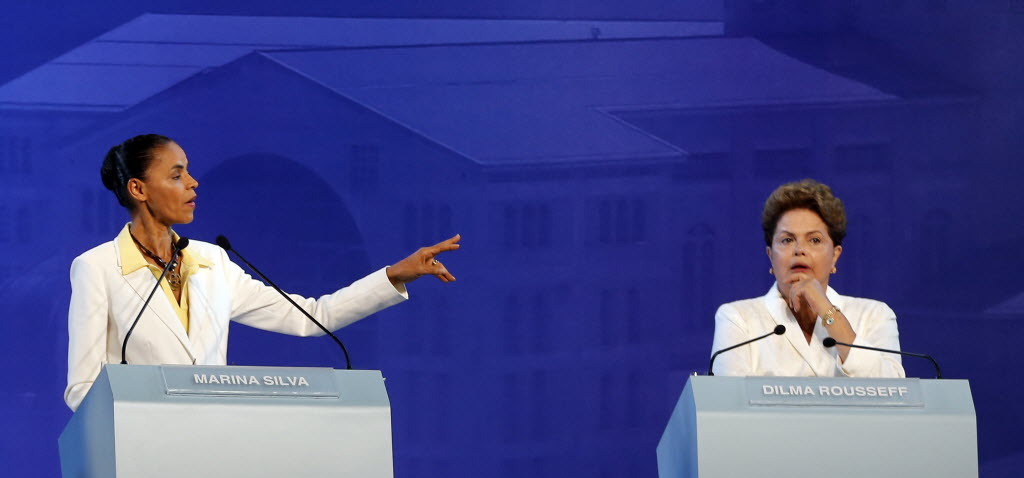If Brazil is such a macho, backwards country, how has it managed to put on a major presidential race between two progressive women*, with barely a sexist protest in the national media? It may take decades before something like that could happen in the United States.
On the heels of Chile’s Presidential election last year, Marina Silva and Dilma Rousseff’s battle in Brazil is the only other presidential election I can find where the two principal candidates are women. This milestone for gender equality seems to comes from an unlikely place, as Brazil and Latin America are infamously “machista” and sexist. But Dilma’s gender barely made ripples when she was first elected in 2010, and the topic has gone practically unmentioned as Marina and Dilma go at each other a month before the first round of this year’s elections.
Putting the candidates’ politics and criticisms aside, it’s a huge feat for women in politics that Marina and Dilma are facing off to be the president of the world’s fifth largest country. This is something I don’t see happening in my country, the U.S., for decades, if not centuries.
The paradox is that I, like many others, generally regard the United States as more progressive on women’s rights than Brazil. In the World Economic Forum’s “Global Gender Report” which measures gender equality based on economic participation, educational attainment, health and survival and political empowerment in 135 countries, the United States was ranked 22 and Brazil is ranked 62.
In 2011, Newsweek/The Daily Beast published a study on the best and worst places for women among 165 countries, and the US was ranked 8th and Brazil was ranked 84.
Sexism in Brazil exists in all forms, from domestic violence and rape, to objectifying women’s bodies and inequality in the workforce. It exists in everyday language, from cat-calls on the street to the popular expressions like “da para casar” which means “you’ll do to marry,” which is used to compliment a young woman’s cooking.
Yet despite these realities, two women are running to be the head of state of the world’s seventh largest economy, and there’s a refreshing lack of sexist questions like the ones we see when women run for president of the United States, such as, “will she be too emotional to govern a country?”
What explains this discrepancy?
Furthermore, if you take a look at the backgrounds of these two women – though completely different – both reflect a progressive electorate. Marina Silva is a mixed-race woman from the rural Amazon, the daughter of poor rubber tappers. She used to work as a housemaid and was illiterate until she was 16. She’s now made a name for herself as a fierce environmentalist and politician. Dilma Rousseff joined a radical left-wing guerrilla movement when she was a young adult during Brazil’s right-wing military dictatorship. In 1970, the regime arrested and tortured her for two years.
Meanwhile in the U.S.A., the thought of electing a woman like Hillary Clinton – who, by the way, fits the exact narrow profile of the majority of U.S. presidents in almost every way except her gender (i.e. she is white, has an elite education and experience in the Senate and White House) – raises a sexist and misogynistic media uproar.
Despite a few questions raised about Dilma early in first her presidential bid, she was never subject to the same misogyny as Hillary Clinton was and still is. Perhaps the fact that Dilma was the hand-picked successor of Luiz Inácio “Lula” da Silva (the most popular president in Brazilian history) helped her bypass some sexist hurdles. Lula himself, though, recently admitted he thought Dilma has suffered from sexism while in office.
While Hillary spoke in New Hampshire, a heckler began chanting, “iron my shirt,” and held up a sign with the same message. She was constantly referred to as being “bitchy,” “shrill” “emotional” and “hysterical” by commentators and media outlets, who also paid meticulous attention to her looks and how well she was aging. The analogue that comes to mind in the case of Dilma is that she is constantly referred to as “mandona,” which you might loosely translate as “bossy.” Many have asked, would a male president be criticized for being “tough” and giving orders?
Sexism exists in many different forms across the world – in almost every country – but where I come from, this Marina-Dilma race looks quite progressive.
Follow Anna Jean Kaiser on Twitter. Above, a photo from a recent debate.
[*Editor’s note – Of course, the Dilma camp contests that Marina is “progressive” while Marina insists that Dilma is not. By global feminist standards, it may to difficult to consider either ‘progressive’ objectively, as both oppose legal abortions and gay marriage. However, they are most certainly progressive in the relative sense, in that they both claim to be progressive (no one here is a declared conservative) and are to the left of Brazil’s political center. Also, an earlier version of this article failed to adequately discuss the importance of Chile 2013]


